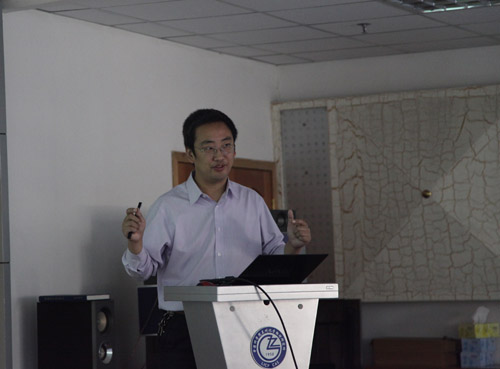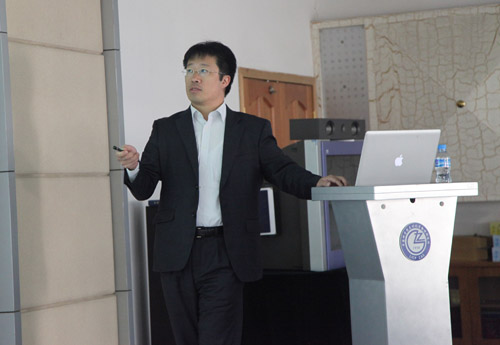Professor SUN Taolei at the State Key Laboratory of Advanced Technology for Material Synthesis and Processing, Wuhan University of Technology, and Dr. Haeshin Lee at the Graduate School of Nanoscience and Technology, Korea Advanced Institute of Science & Technology, visited the Lanzhou Institute of Chemical Physics (LICP), Chinese Academy of Sciences (CAS), on October 24. During their visit, they each delivered a report entitled Bio-inspired Adhesion of Marine Mussels for Nano/Bio/Energy Technology and Chiral interface material respectively.
In the report entitled Chiral interface material, Professor SUN Taolei introduced the research background of chiral interface material and his group’s work in this area. Chiral phenomena exist widely in nature. By introducing chiral effect into the study of materials and life systems on interface scale, a grand new research field, namely chiral interface materials, appeared. Professor SUN’s group has developed several bio-interface materials. These materials are all responsive to the stimulus of temperature, ph value, ion, chiral molecules, drug molecules, small biomolecules, chiral molecules,etc.
The title of Dr. Haeshin Lee is Bio-inspired Adhesion of Marine Mussels for Nano/Bio/Energy Technology. Inspired by mussels, Dr. Haeshin Lee and his colleagues has successfully developed dopamine as the “omnipotence glue” for the organic/inorganic surfaces. They have utilized the study in superhydrophobic surface modification, hyroxyapatitie crystal growth, block copolymer lithography, carbon nanotube fiber composites, and surface-driven gene delivery. The future directions of mussel inspired chemistry was also introduced in the presentation.
Introduction to Professor SUN Taolei:
Professor SUN Taolei received his doctor’s degree from the Institute of Physics and Chemistry, Chinese Academy of Sciences, in 2002. In 2005 he pursued his study in University of Münster, Germany, as a Germany Humboldt scholar. In 2006 he was presented the Sofja Kovalevskaja Award by the Alexander von Humboldt Foundation and Federal Ministry of Education and Research, Germany. He was given 100 0000 euro to build up his own research team. In 2009 he returned to China and joined Wuhan University of Technology. His main research interests include chiral and responsive functional interface materials. He has published more than 50 papers on Acc.Chem.Res., Chem.Soc. Rev., Angew. Chem. Int. Ed., J.Am.Chem.Soc., Adv.Mater., etc, which received more than 2300 citations.
Introduction to Dr. Haeshin Lee:
Haeshin Lee received his M.S. degree in biological sciences in 1997 from the Korea Advanced Institute of Science & Technology, Ph.D in biomedical engineering in 2008 from Northwestern University. He held post-doctoral positions in department of chemical engineering, MIT (advisor Robert S. Langer & Daniel G. Anderson). Currently, he held an appointment as an associate professor at department of chemistry, the Graduate School of Nanoscience & Technology and Korea Advanced Institute of Science & Technology. He has co-authored 60+ refereed articles in archival journals (including Nature, Science, Proc. Natl. Acad. Sci., J. Am. Chem. Soc., Angew. Chem. Int. Ed., Adv. Mater., Adv. Func. Mater. etc), and one book. His research interests are the biomimetics which is the application of systems found in nature to the study and design of engineered systems, generalized strategy for functionalization of any material surfaces inspired by mussel adhesion, adhesive anti-bacterial and anti-fungal compounds, development of synthetic gecko adhesives nanoparticle synthesis, biointerphases etc.
He is recipient of pioneering new knowledge award, KAIST (2012), teaching award, KAIST (2010,2011), POSCO, Chung-Am research award (2012), top 100 science stories discover magazine, (2008), graduate student award, materials research society meeting, Boston, (2007), Richard W. Jones best poster award, BME, northwestern university, (2007).

Professor SUN Taolei is delivering a lecture.

Dr. Haeshin Lee is delivering a lecture

